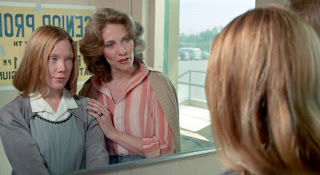Carrie (Brian De Palma, 1976, USA)
Carrie launched the careers of both Stephen King and Brian De Palma, and not without good reason. Made on a shoestring $2 million budget, Carrie did not seem destined to become a horror classic by any stretch of the imagination. Yet it became one, in large part due to Brian De Palma pulling out all stops in the making of this film. Critics will often lambast De Palma for being a "showy" director as if the whole point of cinema was not spectacle. And while De Palma was of course heavily influenced by Dario Argento and Italian giallo films (Pino Donaggio's longstanding collaboration with De Palma began on this film), De Palma brought the giallo to America and Americanized the genre.
While most people know about the finale of Carrie even if they've never seen it, what is striking about the film in retrospect is how little of the film that finale occupies. For the most part, Carrie was a "teen movie" before such movies existed. Owing something to Lucas's American Graffiti, the film defined many of the tropes of the genre that came to its full fruition in the 90s with films like 10 Things I Hate About You. Carrie is ostensibly the villain of the film, but never has a villain been more sympathetic on film. Sissy Spacek embodies the character to such a degree that it is often painful to watch her performance.
The finale, of course, is tour de force filmmaking and is still shocking to this day. De Palma's lead-up to the bucket drop is some of the best filmmaking ever done, and the consequent bloodbath is operatic in scope and scale. Carrie is not without minor faults, but these are overshadowed by just how iconic the film is in its power - even in the film's final moment, it is iconic.
10/10




Comments
Post a Comment